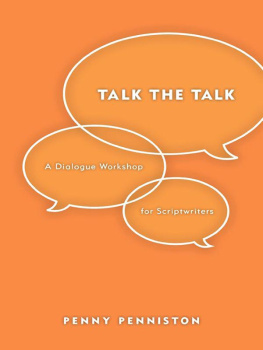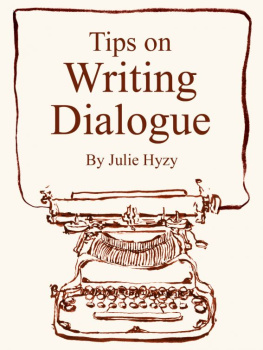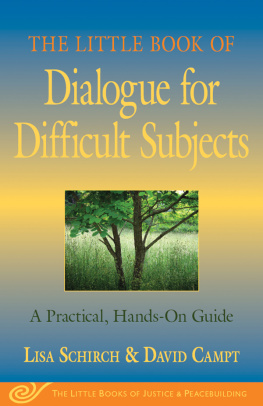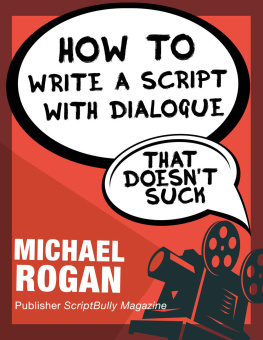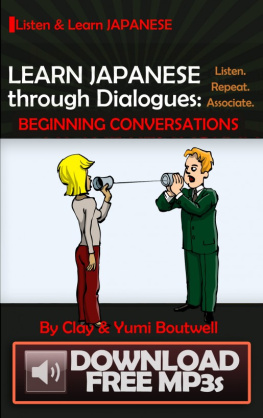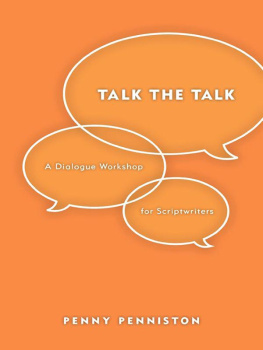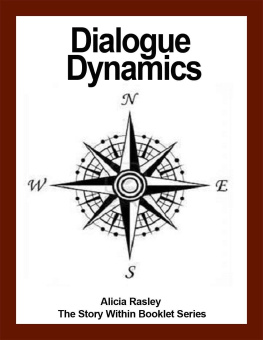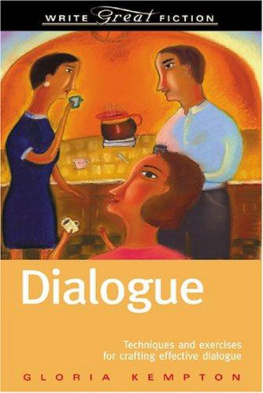Penny Penniston - Talk the Talk: A Dialogue Workshop for Scriptwriters
Here you can read online Penny Penniston - Talk the Talk: A Dialogue Workshop for Scriptwriters full text of the book (entire story) in english for free. Download pdf and epub, get meaning, cover and reviews about this ebook. year: 2010, publisher: Michael Wiese Productions, genre: Children. Description of the work, (preface) as well as reviews are available. Best literature library LitArk.com created for fans of good reading and offers a wide selection of genres:
Romance novel
Science fiction
Adventure
Detective
Science
History
Home and family
Prose
Art
Politics
Computer
Non-fiction
Religion
Business
Children
Humor
Choose a favorite category and find really read worthwhile books. Enjoy immersion in the world of imagination, feel the emotions of the characters or learn something new for yourself, make an fascinating discovery.
- Book:Talk the Talk: A Dialogue Workshop for Scriptwriters
- Author:
- Publisher:Michael Wiese Productions
- Genre:
- Year:2010
- Rating:4 / 5
- Favourites:Add to favourites
- Your mark:
- 80
- 1
- 2
- 3
- 4
- 5
Talk the Talk: A Dialogue Workshop for Scriptwriters: summary, description and annotation
We offer to read an annotation, description, summary or preface (depends on what the author of the book "Talk the Talk: A Dialogue Workshop for Scriptwriters" wrote himself). If you haven't found the necessary information about the book — write in the comments, we will try to find it.
Talk the Talk: A Dialogue Workshop for Scriptwriters — read online for free the complete book (whole text) full work
Below is the text of the book, divided by pages. System saving the place of the last page read, allows you to conveniently read the book "Talk the Talk: A Dialogue Workshop for Scriptwriters" online for free, without having to search again every time where you left off. Put a bookmark, and you can go to the page where you finished reading at any time.
Font size:
Interval:
Bookmark:
Talk the Talk is packed with all sorts of tools to help the characters breathe, stand up, and come alive.
Shawn Lawrence Otto, Screenwriter and Co-Producer, House of Sand and Fog
Put this book in action and see your dialogue leap off the page.
Joan Scott, Founder of Writers & Artists Agency and Joan Scott Management
This is the book dramatic writers have been looking for! Teachers and students alike will find its sound advice and step-by-step approach invaluable and inspiring.
Rebecca Gilman, Playwright and Screenwriter; Author of Spinning into Butter and Boy Gets Girl
Its discussion of status its effect on dialogue, and how it shifts in various contexts is particularly illuminating.
Wendy MacLeod, Playwright and Screenwriter; Author of The House of Yes , Schoolgirl Figure , and Juvenilia .
Hollywood wants great scripts. Great scripts must have great dialogue. Great dialogue writing begins with this book.
Brantley M. Dunaway, Producer, Love in the Time of Cholera
Talk the Talk opened my eyes to new ways of looking at developing characters and their dialogue. Highly recommended for course work or for the individual.
Paul Chitlik, Author of Rewrite: A Step-by-Step Guide to Strengthen Structure, Characters, and Drama in Your Screenplay
Although Talk the Talk is a must-read for student and aspiring screenwriters, it also should be heralded as a fantastic resource for professionals. The exercises are simple, yet thought-provoking, and are easily adjusted for television, film or theatre. Talk the Talk will certainly help writers of all levels break free of old ruts and look at dialogue in a fresh, dynamic, creative way!
Steve Baldikoski, Television Writer and Producer, Glenn Martin, DDS ; 8 Simple Rules for Dating My Teenage Daughter ; Andy Richter Controls the Universe
Thorough, thought-out and extremely helpful this book will make your dialogue explode off the page.
Matthew Terry, Filmmaker, Screenwriter, Teacher; Columnist for www.hollywoodlitsales.com
Talk the Talk will help you determine which characters should be allowed to speak and what they should say, depending on their importance to your story.
Mary J. Schirmer, Screenwriter, Writing Instructor, Film Critic
Talk the Talk is an accessible and wonderfully helpful book. Full of exercises, examples, and great advice, this book illuminates why, where and when dialogue is needed.
Jule Selbo, Screenwriter; Associate Professor, Lead of Screenwriting Program, California State University, Fullerton
Talk the Talk is a perfect gem of a book that directly addresses the daunting challenge of writing dialogue that works. It should be a prerequisite for every writer's library, whether you're tackling a novel, play, or script.
Kathie Fong Yoneda, Script Consultant, Workshop Leader, Author of The Script-Selling Game: A Hollywood Insider's Look at Getting Your Script Sold and Produced
Whether you're writing comedy or drama, movies or plays, even novels and short stories Talk the Talk is a must-have workout for the imagination.
Chad Gervich. TV Writer/Producer; Author, Small Screen, Big Picture: A Writer's Guide to the TV Business
As Penniston states in the book's introduction, Great moments of dialogue are the great moments of film and theater. With this workshop, you'll learn to create your own insightful, original dialogues that will give your writing a competitive edge. What are you waiting for?
Amanda Porter, Associate Editor, School Video News

PENNY PENNISTON
M I C H A E L W I E S E P R O D U C T I O N S
Published by Michael Wiese Productions
3940 Laurel Canyon Blvd. Suite 1111
Studio City, CA 91604
(818) 379-8799, (818) 986-3408 (FAX)
www.mwp.com
Cover design by MWP
Interior design by William Morosi
Edited by Gary Sunshine
Printed by McNaughton & Gunn
Manufactured in the United States of America
Copyrightright 2009
All rights reserved. No part of this book may be reproduced in any form or by any means without permission in writing from the author, except for the inclusion of brief quotations in a review.
Library of Congress Cataloging-in-Publication Data
ISBN 978-1-932907-70-4
Penniston, Penny, 1970
Talk the talk : a dialogue workshop for scriptwriters / Penny Penniston.
p. cm.
ISBN 978-1-932907-70-4
1. Motion picture authorship. 2. Television authorship. 3. DramaTechnique. 4. Dialogue. I. Title.
PN1996.P46 2010
808.066791dc22
2009029892
Printed on Recycled Stock
CONTENTS
GEORGE: My mother thanks you. My father thanks you. My sister thanks you. And I thank you.
Yankee Doodle Dandy (1942)
Acknowledgments
Thanks to Dave Bell, Jessica Ross, and Kathy Stieber for allowing me to raid their DVD collections. Thanks to Kathleen Lange for her assistance in compiling the dialogue quotes that begin each chapter. Finally, I am grateful to Michael Wiese, Ken Lee, and Gary Sunshine for their guidance in putting this book together.
This book was born out of my experience teaching Dramatic Writing at Northwestern University. With warm wishes, I dedicate it to all of my former students. Keep writing.
HENRY: Words if you look after them they can build bridges.
Tom Stoppard ( The Real Thing )
Introduction
WHY YOU NEED THIS BOOK
Dialogue puts conversation in motion. Great dialogue moves like a great athlete; it is nimble, precise, and powerful. It commands the attention, yet feels effortless in its execution. However, if we want our dialogue to move like an athlete, then we must train like an athlete.
This is a book of exercises to tone the scriptwriter's dialogue skills. It is written for university-level playwriting and screenwriting students or preprofessional writing groups and workshops. It is also appropriate for professional playwrights and screenwriters who wish to keep their dialogue skills sharp.
Most playwriting and screenwriting books take a sweeping scope. They tend to include a brief discussion of dialogue, but then abandon the topic in favor of other issues. Talk the Talk is exclusively a focused examination of and an exercise regimen for dialogue writing. By mastering this fundamental building block of dramatic writing, authors breathe life into characters and create scripts that jump off the page. Great moments of dialogue are the great moments of film and theater.
HOW TO USE THIS BOOK
This book is based on a few core beliefs about the teaching of writing:
Writers Learn by Writing
The frustrating thing about dialogue writing is that it seems like it ought to be easy. We all engage in dialogue every day. We've all been in situations that are funny or ironic or tragic. And, being human and living in a world of humans, we are all experts on human behavior. So why is it so hard?
The truth is that all those things are just the notes of drama. They are the keys on the piano. Anyone can come along and make noise on a piano all you have to do is bang on the keys. But to make music on a piano that is harder. It requires striking a particular set of notes in a particular sequence in order to generate a particular set of sounds. Trained pianists do this gracefully and beautifully. Their fingers glide across the keys. They make it look effortless. The truth is that it only got to be effortless after lots and lots of practice.
So if you want to be a writer, practice writing. Practice it the way a musician practices her instrument. Great piano players did not become great by attending lectures and reading books on music theory. Those things certainly helped, but, at the end of the day, it is years and years of fingers on the keyboard that make a piano player. Scales and drills and tudes get played over and over again until they become instinctive. Technique that once required careful concentration becomes effortless and subliminal. It is the same with writing. Think of this book as a book of scales and tudes. Use this book to drill technique into your muscle memory so that when you sit down at your keyboard in the future, the dialogue will flow effortlessly.
Font size:
Interval:
Bookmark:
Similar books «Talk the Talk: A Dialogue Workshop for Scriptwriters»
Look at similar books to Talk the Talk: A Dialogue Workshop for Scriptwriters. We have selected literature similar in name and meaning in the hope of providing readers with more options to find new, interesting, not yet read works.
Discussion, reviews of the book Talk the Talk: A Dialogue Workshop for Scriptwriters and just readers' own opinions. Leave your comments, write what you think about the work, its meaning or the main characters. Specify what exactly you liked and what you didn't like, and why you think so.

